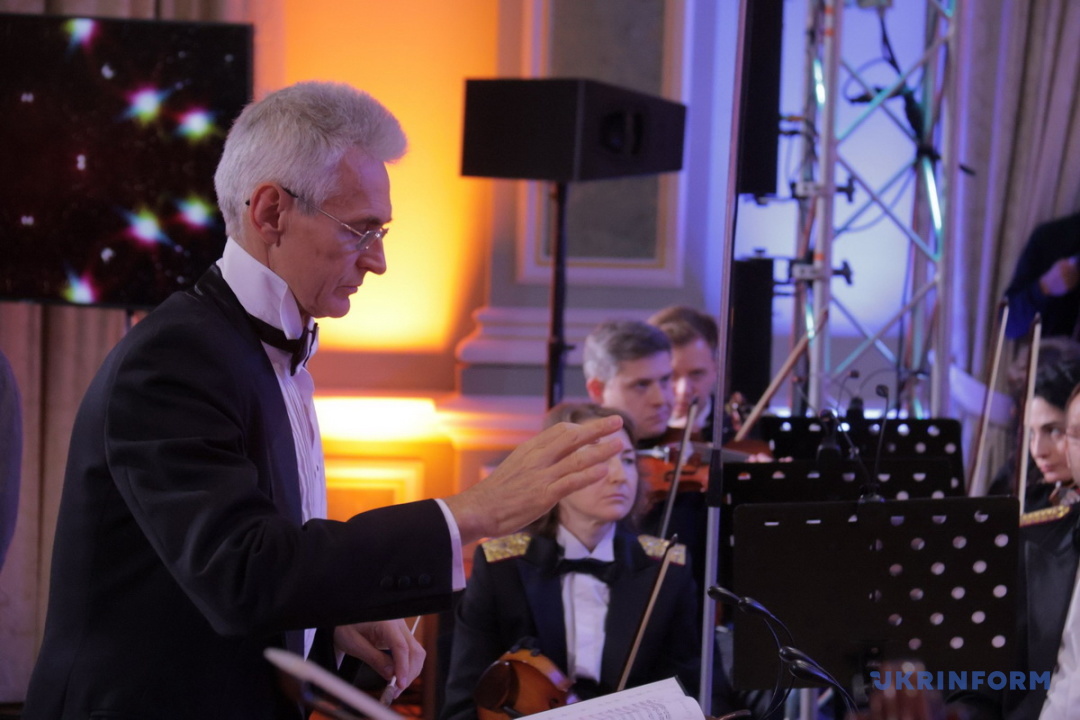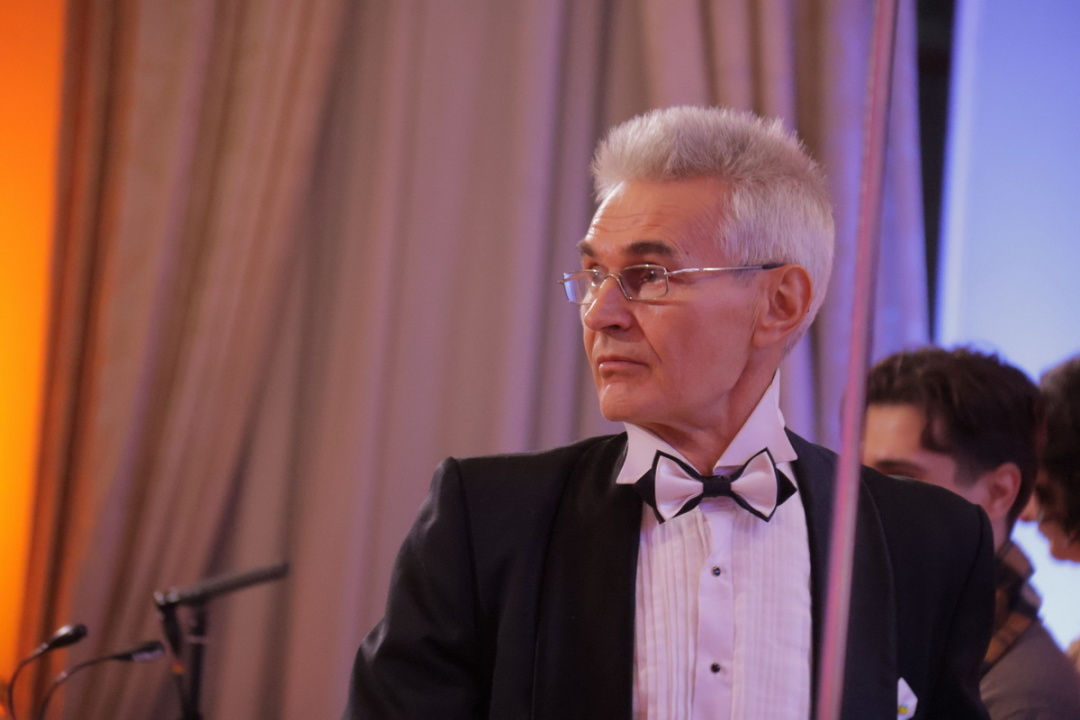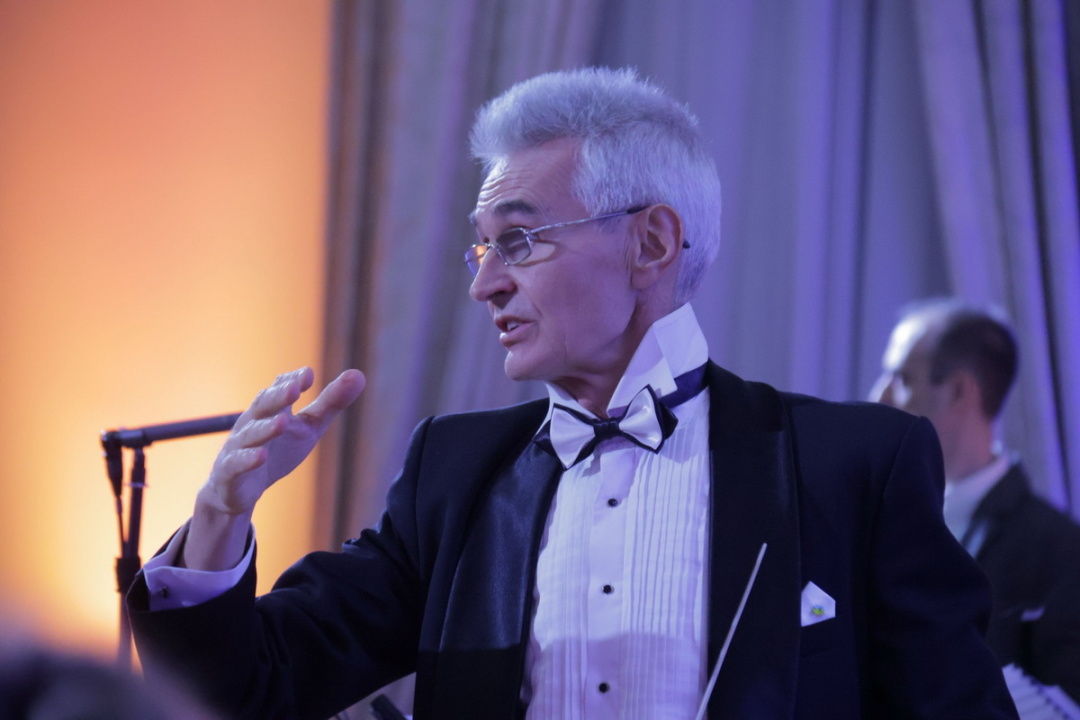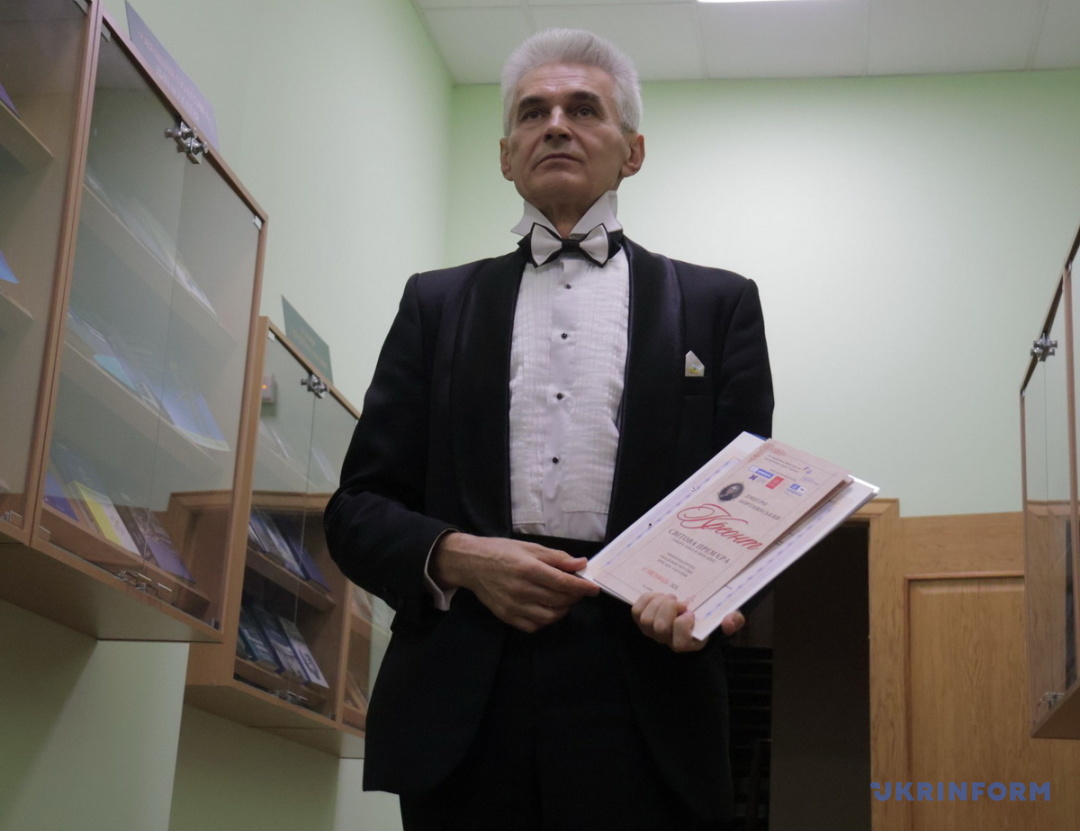On November 11, Kyiv hosted the world premiere of Creonte, the first opera by Ukrainian composer Dmytro Bortnyanskyy.
Herman Makarenko is a People's Artist of Ukraine, conductor at Ukraine’s National Opera, artistic director of the Kyiv-Classic Orchestra, Head of the UNESCO Chair in Music, Education and Science for Peace, Doctor of Arts (History), Honorary Citizen of Kyiv, Ambassador of Ukrainian Culture, UNESCO Artist for Peace.
In an interview with Ukrinform, he told about how this real treasure was rediscovered after being considered missing for nearly 250 years. After all, this conspicuous work by the baroque composer, singer and conductor is a great asset not just to the Ukrainian and European culture, but also to the world culture, considering his other works created in the 18th century.

- Mr. Herman, the world premiere of the opera Creonte was undoubtedly a major step towards protecting our culture and self-identification. How did you manage to implement this project?
- First of all, this is a contribution by Ukraine’s music community to the fight against the Russian aggressor and the de-occupation of our culture. So that we ourselves can feel and appreciate the pearls of European and global level our people have created over many centuries.
The war is now going on not only on the front lines, a hybrid war is ongoing, when the eastern neighbor is seeking to destroy not only our territory, but also our self-identity, spirituality, and culture. For centuries, Russia has been trying to disguise as theirs, steal the best world-class artists of Ukraine: Ivan Aivazovsky, Ilya Repin, Kazimir Malevich, Arkhip Kuindzhi, Mykola Gogol, Maksym Berezovsky, Semen Hulak-Artemovsky, and, of course, Dmytro Bortnyanskyy.
For many years, the narratives of the "Russian world" had been imposed on us, and now we are returning to the world the first opera by Dmytro Bortnyanskyy, a founding farther of professional Ukrainian music, a composer of European dimension who had had a significant impact on the development of musical culture of the 18th century and beyond.
FOR 250 YEARS, THE OPERA "CREONTE” HAD BEEN LISTED IN ALL ENCYCLOPEDIAS AS MISSING. BUT WE DECIDED THAT THIS SHOULD NOT BE THE CASE
- This project came true due to the support not only from the Ukrainian authorities, but also from the international and European institutions that care about the preservation of European cultural heritage…
- Yes. This historic event took place under UNESCO’s patronage, which was provided personally by the Director General, Madame Audrey Azoulay, as well as Europa Nostra, a pan-European federation of organisations and institutions in the field of cultural and natural heritage.
It is very important that the Ukrainian authorities – the Office of the President, the government, the Ministry of Culture, and the Ministry of Defense – pursue a consistent policy of upholding our spirituality and protecting our culture. And I am very grateful to the Ministry of Foreign Affairs of Ukraine and Minister Andriy Sybiha, as well as to the Diplomatic Academy at the Ministry of Foreign Affairs and its Director, Ambassador Extraordinary and Plenipotentiary of Ukraine Hennady Nadolenko for their support in implementing this project.
- Ahead of the premiere, you said that Bortnyanskyy and his opera Creonte had united five European countries. How did he do it?
- I will tell you. His father Stefan Shkurat resided in the Lemken region, then part of Rzech Pospolita, before he moved to the Sumy region, but changed his surname for Bortnyanskyy, in memory of his home village of Bortne. His son was born in Hlukhiv, which was also the home town of Maxym Berezovskyy; that region is rich in talents.
Dmytro grew up as an exceptionally gifted kid. When seven, he got into the royal mail voice choir at the court of Catherine the Great in St. Petersburg. The Russian Empire was selecting the best from around the world. Where the best voices are to be found? In Italy and Ukraine, as you may know. Maxym Berezovskyy and, in the 19th century, Semen Hulak-Artemovskyy got into the same royal mail choir as Bortnyanskyy did.
After ten years of singing in the choir, Dmytro's gift became so obvious that he was sent to study in Italy with the world-renowned maestro Baldassare Galuppi. We consider Bortnyanskyy a church composer, but he began his creative path as a secular composer. And, at the age of 25, he composed his first opera, Creonte, based on Sophocles' tragedy Antigone.
Thus, in this opera, Bortnyanskyy united Ukraine, Poland (from where his family roots came), Italy (where he studied and where the opera was staged for the first time), Greece (because this work is based on the plot of Sophocles, an ancient Greek) and Portugal (where the score was discovered).
The premiere took place in 1776 at the San Benedetto Theater in Venice, and was a stunning success among the Italian public. It was planned to be staged at theaters in other European countries as well, but... the notes disappeared without a trace for unknown reasons. And all encyclopedias, all musical literature for almost 250 years had said and still say that Bortnyanskyy composed six operas, and his first opera Creonte has been lost forever to humanity. Our team decided that this is not entirely true...

THE CREONTE OPERA MANUSCRIPT HAS PASSED THE MOST STRINGENT CHECKS FOR AUTHENTICITY
- So, you were searching for the lost score of Creonte purposefully, and this finding was not accidental?
- Olha Shumilina, a music historian, Doctor of Arts (History), lecturer at the Mykola Lysenko Lviv National Music Academy was searching for it purposefully, but found it, one might say, by accident (smiles). Everything comes if you work on it for years, for decades, not for a day or two. This is exactly what happened to Ms. Olha, who surprising found this manuscript in the archives of the Portuguese library of Ajuda in Lisbon, where manuscript collections of the Portuguese royal court are stored.
Ms. Shumilina is a lead expert in Baroque and Classicism, has perfect knowledge of Ukrainian authors of this period. Actually, her search was for works by Maksym Berezovskyy (whose works are the focus of her research), but she surprisingly came across the work by Bortnyanskyy, which had been considered missing. Since these two composers were contemporaries of each other, worked contemporaneously in the same era, their works could expectedly be stored in one and the same archives. Quite surprisingly, she saw the title Creonte on an electronic catalogue, bought travel tickets with her own money, went to Portugal, came to the library to find there the score of the priceless treasure not only of the Ukrainian people, but also of the European and world culture! She made photocopies and brought them to Ukraine.
- How was the found score checked for authenticity?
- After I met with Ms. Olha, I was checking the handwritten score’s authenticity for a very long time; it passed all of the most stringent checks: as you may understand, if we are going out into the world with the 250-year-old masterpiece we have discovered, then we must be perfectly convinced it is authentic. Everything was confirmed – we found it to be really Bortnyanskyy's opera. First, the inscription on the title page, second, this library, in 1803, began publishing its catalogs, in which this work was already recorded as Bortnianskyy's opera. Third, there was one aria left, which was managed to be transcribed back then – the aria of Antigone. It exists in the music space of the world, was performed and recorded. And when we compared this aria with that contained in the score found in Portugal, everything matched. There were no doubts left that Dmytro Stepanovych Bortnyanskyy is the author of this opera, Creonte.

THE NEXT STEP WILL BE TO STAGE PRODUCTION OF CREONTE WITH COSTUMES AND SCENERY
- The paper medium has been preserved in good condition, given its age of two and a half centuries…
- The condition of the score is good, more or less. The penman did not seem to bother to write out every letter and note carefully, but wrote it just to make it in time, given the large volume, consisting of 540 pages of handwritten text. Creonte is an opera seria. In those days, operas of two types were performed: opera buffa (comedic opera which features subjects of daily life) and opera seria, which is characterized by serious, historical dramas and a noble audience. Creonte consists of two acts lasting for an hour and a half and 55 minutes, respectively.
When we decided to do the project “The Return to the World of Bortnyanskyy’s First Opera ‘Creon’”, we figured the work would be done in five separate queues. The first was to get the notes transcribed, typed out and converted into a digital format, which is a pretty complicated process, given that a score written in the 18th century differs somewhat from that written in the 21st century, and that needed to be factored for. The opera was composed to a text in Italian, which too had to be transcribed and translated.
Second was to stage the world premiere of the opera in concert performance in the capital of Ukraine. Third is stage production to be performed both in Ukraine and at the best opera venues in the world.
Fourth is a presentation at major international platforms, including the UNESCO Headquarters and the European Union.
Finally, the fifth and last step would be the publication of a series of music materials to include orchestral voices, a choral score, five soloist parts, the harpsichord part and the score for piano and orchestra. That is, we want to publish a meaningful musical work in printed format - in Ukrainian, Italian, and English. This will make it possible to return it to the world in its entirety, and so that everyone wishing to can perform either the entire opera or separate fragments thereof, a solo aria accompanied by an orchestra or a piano. This opera by Bortnyanskyy is worthy of any form of orchestration possible.
- Will work along the five tracks be done simultaneously or in separate queues?
- We are proceeding step by step. It mattered for us that the world premiere took place. The next step will be to stage production with costumes and scenery, but at which theater is too early to say yet.
- As far as I’m aware, you have already received a certificate of state registration of arrangement copyright for the opera Creonte.
- Just on the day of the premiere performance, Ukraine’s National Office for Intellectual Property and Innovations (IP Office) presented the certificate, in paper form, to me and Olha Shumilina, while state registration of the copyright in electronic form was carried out a few days earlier.
The opera Creont is indeed a part of the cultural heritage of all the humankind, albeit in the form as we transcribed and arrange it. In order to secure its independence and sovereignty, Ukraine must work in all the domains possible, among which the domain of culture and intellectual property takes an extremely important place.

- Tell us about who performed the world premiere?
- I will do so with great pleasure! First of all, I would like to note that, before embarking on the project, it was necessary to find and gather a team of highly proficient performers, given that the opera is accompanied by an orchestra and involves a choir and five soloists. Furthermore, in those days, an opera was necessarily accompanied by a harpsichord and a basso continuo, performed by a cello.
I would like to note that Dmytro Bortnyanskyy lived and worked at the same time as Wolfgang Amadeus Mozart. Dmytro Stepanovych's music was based on Ukrainian intonations, his own style and manner of composing, but the Baroque and Classicist styles are common to them both. Suffice it to give one example: at all international competitions for vocalists, violinists, cellists, instrumentalists, and conductors, a work by Mozart is invariably performed in the first round. That is, this is a litmus test by which the competition jury evaluate the professional level of any competing performer. If you can play Mozart, you can play almost anything. The same goes for Bortnyanskyy, because they share one and the same style, which is extremely complex and difficult to perform, and it took a lot of professional effort for each performer to learn their parts.
The world premiere was performed by the National Presidential Orchestra headed by Maksym Husak, and the National Honored Academic Chapel of Ukraine Dumka led by People's Artist of Ukraine, Hero of Ukraine, Taras Shevchenko National Prize winner, professor Yevhen Savchuk.
Performers: Serhiy Bortnyk (Creonte) – Ukraine’s National Philharmonic soloist; Olha Fomichova (Antigone) – Ukraine’s National Opera soloist, Honored Artist of Ukraine; Danylo Kotok (Haemon) – Kyiv Municipal Academic Opera and Ballet Theater soloist; Stanislav Pashchuk (Adrastus) – Kyiv Municipal Academic Opera and Ballet Theater soloist; Marharyta Bilokiz (Ismene) – mezzo-soprano; Olha Shadrina-Lychak (harpsichord solo) – head of the Chair of Early Music, PhD of Arts History, international competitions prize winner.
I am immensely grateful to the entire creative team not only for their professionalism and artistry, but also for their dedication and patriotism.
When I turned to the leaders of the teams and to each of the soloists personally, literally, everyone, despite their busy schedules and the current situation of the country, said: yes, we will definitely take part in this project. And in a record short time – less than two months, we prepared all this musical material. Major productions like this usually take at least 4-5 months to prepare. All the performing participants worked with great inspiration between tours, performances, concerts, rehearsals. And despite the missiles flying over our country on a daily basis, despite all the people being under constant threat to life and under psychological pressure, our performers will bring this spiritual treasure to the world audience to show that even in such terrible times, when the enemy wants us wiped off the face of the earth, the Ukrainian people cherish their cultural values and protect their spirituality and culture.
Interviewed by Lyubov Baziv. Kyiv
Photo Credit by Yevhen Kotenko, Ukrinform
